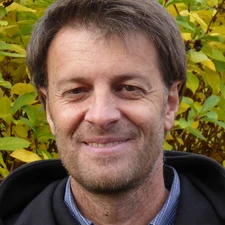Andreas Kääb

The 2019 Louis Agassiz Medal is awarded to Andreas Kääb for innovative and multidisciplinary contributions to the field of remote sensing of the cryosphere, with applications in glacier mass balance, permafrost and geohazards.
Andreas Kääb is a professor of remote sensing at the University of Oslo, in the Department of Geosciences. He started his career at a time of rapid growth of satellite remote sensing data, but lacking robust analysis techniques to extract accurate information for many cryospheric applications. Kääb addressed this challenge by developing novel approaches, using multiple sensors (e.g. optical and radar) to characterise cryospheric processes at different spatial and temporal scales. His creativity and profound insight in the processes under consideration allowed him to apply these techniques to a wide diversity of cryospheric problems, ranging from changes in glacier altimetry and permafrost to ensuing geohazards such as ice avalanches and periglacial lake formation and outbursts.
Kääb’s publications and the research projects he led reflect an unparalleled combination of creativity, breadth and depth of research in cryospheric remote sensing. He (co-)authored authoritative papers on the analysis and minimisation of errors, so as to ensure the most accurate possible delineation of glaciers, enabling the construction of glacier inventories that are fundamental to the study of the impact of global warming on glacier extent and volume. His novel applications of ICESat laser altimetry over rugged topography culminated in highly influential studies on the recent mass loss, or lack thereof, of Himalayan glaciers. More recently, Kääb led an international group of researchers that reported on an unprecedented, surge-type collapse of two adjacent glaciers in western Tibet that might have been triggered by rapid climate change and thus has significant consequences for geohazard predictions.
In addition to his very significant scientific achievements, Kääb also serves the scientific community and society in several important ways. For eight years, he was editor for the leading scientific journal The Cryosphere, and he currently is lead author of the IPCC special report on Oceans and Cryosphere in a Changing Climate, to be published in 2019. He also was long-term chair of the International Working Group Glacier and Permafrost Hazards in Mountains of the International Association for the Cryospheric Sciences and the International Permafrost Association. Kääb also actively teaches and supervises at the undergraduate, graduate, doctoral and postdoctoral levels. He mentored a large group of MSc and PhD students and postdoctoral researchers, resulting in excellent publications and exceptional careers, making him an outstanding role model to early career scientists coming into the exciting field of cryospheric remote sensing.
In summary, Andreas Kääb is one of only a few scientists that combine seminal contributions to data analysis methods in remote sensing of the cryosphere with improved understanding of critically important processes, such as the response of glaciers and permafrost to climate change and the geohazards this induces. This makes him a very worthy recipient of the Louis Agassiz Medal.
